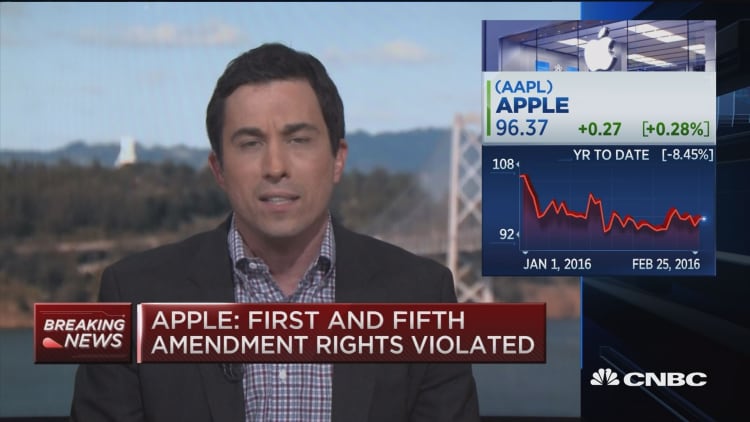Is the FBI violating Apple employees' First Amendment rights in its efforts to extract data from a terrorist's iPhone?
Apple filed a motion late last week to vacate a court order obtained by FBI to create a special computer code to unlock the iPhone used by San Bernardino attacker Syed Rizwan Farook. One argument in Apple's motion is that code is a form of speech — and forced code from the government amounts to compelled speech and viewpoint discrimination in violation of the Constitution.
The issue is likely to come up Tuesday at a Capitol Hill hearing. In prepared testimony, Apple counsel Bruce Sewell said giving the government a tool to unlock iPhones would weaken the security of hundreds of millions of Apple devices.
While lower courts have ruled that computer coding is speech, Apple's argument enters thornier legal territory, experts said.
Code is written primarily to communicate to machines. Andrew Crocker, staff attorney at the Electronic Frontier Foundation, compares source code to other technical forms of communication like sheet music or mathematical equations.
"Programmers write code to have computers do things, but other people can read that code, because it has comments in it," said Crocker, whose foundation filed court papers to support Apple. "Just because you and I don't understand it doesn't mean there aren't some people who do. Programmers will tell you there is a right way to write code: There's cool code and elegant code. It's a form of communication separate from or alongside form the instructions for the computer."
Vivek Krishnamurthy of Harvard's Cyberlaw Clinic said some forms of expression can be ordered.
"It's pretty clear there are certain types of speech you can't compel," Krishnamurthy said. "[The government] can't compel you to voice support of Republicans or Democrats or some other type of belief. But you can compel a private company to put a warning label on a product. So it can be constitutionally permissible in some circumstances."
The computer in a car that deploys an airbag, for instance, is a code compelled by law, Krishnamurthy said. Indeed, in the unlikely case that the broadest form of Apple's argument is taken, it could make all computer-based transactions subject to heightened scrutiny under the law, said Stuart Benjamin, a law professor at Duke.
"The Supreme Court has consistently found that self-expression is necessary for First Amendment protections," Benjamin said. "When I send oil through a pipeline, even if it's [intended as] a message of some sort, unless it's a substantive expression that a recipient can understand, I have not done something that's a communication."

Crocker said Apple's argument has been successfully used in other court cases involving encryption. For example, he noted, the Ninth U.S. Circuit Court of Appeals ruled in 1999 that source code is protected by the First Amendment.
In that case, Daniel Bernstein, then a doctoral student at Berkeley, designed an encryption code called Snuffle that he wanted to publish and present within the scientific community. The court rejected the government's argument that export of encryption should be limited because it is a tool "used to conceal communications of terrorists, drug smugglers, or others intent on taking hostile action against U.S. facilities, personnel, or security interests."
In another case, a court declared that a hacker named Eric Corley was protected by the First Amendment when he authored a blog post containing code that could de-encrypt DVDs and enable movie piracy.
Still, though Krishnamurthy personally thinks Apple has the better policy arguments, he said it's a "pretty attenuated claim" that the government is discriminating against Apple's point of view.
"The question is, 'Is it really conveying a message by including this code or is it just engineering and design choices?'" Krishnamurthy said.
To be sure, Apple's First Amendment claims are secondary to its extensive criticism of the All Writs Act, the law at the crux of the case. But while the proceedings carry on in court, society is left to wrestle with all implications of the case, including those in the Bill of Rights.
"I think the answer is not at all clear," Benjamin said.





